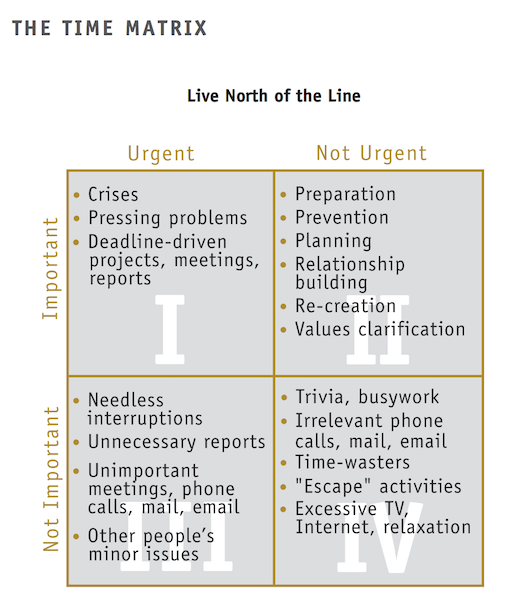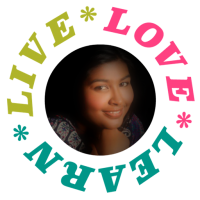I was listening to the audio book First Things First this weekend. It helped me gain a new perspective on holistic life balance. And I thought, let me share some of my initial thoughts with other Goal Getters out there.
Let me start with one of the chapter titles on First Things First – “How many people on their deathbed wish they’d spent more time at the office?” My guess – No one!
A few months back, I had this “perfect” day. For once I had completed all the tasks for the day at work. Keeping with that momentum I headed home and embarked on some major house cleaning. I felt pretty pleased with myself for about 15 minutes after all this. I was expecting to feel “complete”! But no, the day wasn’t perfect after all. I missed my lunch date with my husband. I had not returned a call to a very dear friend who needed me. I had skipped the gym. I had even missed my family prayer time that day. So though I had received a few kudos from my colleagues at work and had a sparkling clean home, I missed things that really mattered to me. I had not put first things first.
Many times our definition of “success” is in terms of a professional growth or financial achievement. Then one day an illness, divorce, death or emotional breakdown happens and our eyes open to reality. That is when we truly realise what is most important in our lives.
First Things First talks about how we spend our time versus what is truly important to us. The metaphors used are that of the clock and the compass.
- The clock represents our appointments, activities, commitments, schedules (and I think even other resources like money)
- The compass represents our values, vision, principles and purpose in life
Both are important but always remember – the compass should direct the clock.
But it makes total sense. Because if we have to put first things first, we need to know what those first things are right.
If you feel your life is controlled by situations, people or organisations, then you know your clock is not guided by your compass. It is very normal to feel indecisive between the daily obligations at work/home and the things we really want to do. There are so many demands placed on us by the society we live in and the corporates we work for. And amidst all this, you forget yourself! Which is why it is important to put first things first. Johann Wolfgang von Goethe said:
Things which matter most must never be at the mercy of things which matter least.
I thought only working men/women were plagued by this problem until I spoke to a stay-at-home mum a few weeks ago. Let me share that anecdote here with her permission. She reminded me of Martha Stewart and had one the best-kept homes I have seen. When I excitedly told her that she had a perfect life I dreamt about, she mentioned how much she aches to have some creative time for herself. She loves painting and she is really good at it. But she felt she did not have the time or the energy after her daily chores and home management.
I am not the perfect homemaker, but I try to do things I enjoy every single opportunity I get. So I was quick to give her a new perspective that a window sill being dusty for a day is not a big deal compared to that gnawing feeling she had in her heart. When I left her that day, I texted her “I have half a dozen window sills that need wiping down, so I am not sure if I am the expert on this matter. Good luck with your painting”. And a couple of days later she replied, “Hey, your advice really helped!”. (Glad it did! But I hope I have not broken a future Martha Stewart! 🙁 )
If we fill our days with unimportant tasks and chores that are important to someone else or if we spent our money on something because of pure peer pressure, then it is time for us to align our clocks to our compasses. First Things First goes on to tell us about the time matrix.
Our daily activities can be broken down into 4 quadrants or sections, by urgency and importance as shown below:

- Quadrant 1 – Quadrant of Necessity: This quadrant refers to the crises and deadline-driven activities that are both important and urgent. These activities need to be managed immediately to get them out-of-the-way.
- Quadrant 2 – Quadrant of Quality & Personal Leadership: This quadrant refers to activities that are not urgent but are important like building relationships and planning for achieving long-term goals. These activities are the ones that require our continued focus as they put first things first.
- Quadrant 3 – Quadrant of Deception: This quadrant refers to the interruptions and unimportant tasks that we are sometimes assigned. They may seem urgent but are not important. These activities should be delegated or avoided.
- Quadrant 4 – Quadrant of Waste: This quadrant refers to the time wasters that are neither important nor urgent. These activities should be avoided.
I did the time matrix exercise, and here are my observations:
- My biggest quadrant was Quadrant 3. I found myself doing activities at work that had no implication whatsoever on my job performance or career progression. I found some of the activities in my Quadrant 3 were not actually important to me but were delegated to me based on someone else’s priority.
- I cheated a little by moving some activities from Quadrant 3 to Quadrant 1. These were activities that were assigned to me by someone else. So although the task in itself was not important to me, the relationship was important.
- I realised that in the home area, I need to do more to prevent a crisis than spend time managing it after the fact. This would keep my Quadrant 1 mostly empty.
Do you always put first things first? What does the time matrix tell about your day? Feel free to share in the comments below.
First Things First is a self-help book written by Stephen Covey, A. Roger Merrill, and Rebecca R. Merrill. Have you read this book? Did it affect your life and improve it? Feel free to share your comments and thoughts on the book.
As I progress with the book, I will be back with insights. Until then, feel free to have a read through some of my other articles.
 Sony Simon Live. Love. Learn.
Sony Simon Live. Love. Learn.

As usual very good article ????
Thank you for your kind words.